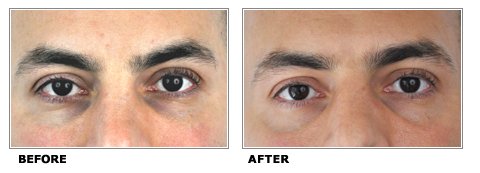Treatment & Procedures
- Mesotherapy For Hairloss
- Laser Hair Reduction
- Moles, DPN's, Skin Tags , Warts
- Reviderm Skin Polishing
- Leucoderma surgeries
- Acne Scar Reduction
- NBUVB Photo Therapy
- Anti-Pigmentation
- Dark circle reduction
- Clinical Research
- Pores
- Melasma
- Spectra Peel
- Tattoo Removal
- Nd:YAG Laser
- Skin Tightening
- Skin Rejuvenation
- Botox & Fillers
- Skin Tightening
- Skin Rejuvenation
- Botox & Fillers
- Vein Removal
- Rosacea
- Hair Transplant
- PRP Treatment For Hair
Dark Circle Reduction: Expert Solutions for Brighter Eyes
Dark circles have become one of the most common problems of the fast paced life we lead today. 9 out of 10 people have dark circles or bags under their eyes at one time or another.

What are the causes of dark circles?
Dark circles are usually caused by many factors; very often they tend to be hereditary but are also compounded if too much time is spent in front of the computer screen or if one has irregular sleeping hours. Many people with allergies and irregular sleep cycles also tend to have dark circles. Smoking, drinking a lot of coffee, soda or caffeine beverages will usually make dark circles worse.
Dark circles can also be caused by too much exposure to the sun. Being out in the sun for long makes the delicate skin around the eyes, thinner or even worse wrinkled. Thin veins rupture and cause pigmentation which can cause dark circles.
Causes of Dark Circles
Understanding the root causes of dark circles is crucial for selecting the right treatment approach. The most common causes include:
- Genetics: Dark circles can be inherited, especially in people with a family history of hyperpigmentation or thin skin around the eyes.
- Aging: As skin ages, it becomes thinner, making blood vessels under the eyes more visible. The natural loss of collagen and fat can also deepen the hollows under the eyes.
- Lifestyle Factors: Poor sleep, high stress, dehydration, and a diet lacking in essential nutrients can all contribute to the development of dark circles.
- Allergies and Skin Irritations: Allergies can lead to rubbing or scratching of the eyes, which can darken the skin around them. Allergic reactions often cause puffiness that can cast shadows under the eyes, making dark circles more prominent.
- Sun Exposure: UV exposure can increase melanin production, leading to hyperpigmentation and dark circles.
- Circulatory Issues: Poor blood circulation can make blood vessels under the eyes more noticeable, adding to the dark appearance.
Lifestyle Changes for Dark Circle Reduction
Making certain lifestyle changes can often help reduce the appearance of dark circles:
- Improved Sleep Habits: Ensuring 7-8 hours of quality sleep each night helps reduce tired eyes and can improve skin health overall.
- Hydration and Diet: Drinking adequate water and incorporating a diet rich in vitamins C, E, and K can promote healthier skin and reduce pigmentation under the eyes.
- Sun Protection: Wearing sunscreen and sunglasses protects the delicate skin around the eyes from UV damage, helping to prevent darkening due to sun exposure.
- Managing Allergies: Using antihistamines or consulting with a doctor about allergy treatment can reduce eye-rubbing and puffiness, which in turn can help prevent dark circles.
Home Remedies for Dark Circles
For a gentle approach to reducing dark circles, some natural remedies may help:
- Cold Compress: Applying a cold compress to the eyes can help constrict blood vessels, reducing puffiness and dark circles.
- Cucumber or Potato Slices: Both contain skin-brightening agents and have a cooling effect, which can temporarily reduce dark circles.
- Tea Bags: The caffeine and antioxidants in tea can improve blood circulation and help reduce discoloration when applied under the eyes.
- Aloe Vera Gel: Known for its soothing properties, aloe vera can hydrate the skin and may help with dark circles over time.
Cosmetic Treatments for Dark Circles
For those seeking more dramatic or quicker results, several cosmetic treatments can address dark circles effectively:
- Topical Creams: Creams containing ingredients like vitamin C, retinol, and hyaluronic acid can help reduce pigmentation and improve skin texture over time.
- Chemical Peels: A mild chemical peel with glycolic or lactic acid can help exfoliate and brighten the skin around the eyes, reducing pigmentation.
- Laser Therapy: Laser treatments target melanin and blood vessels, reducing pigmentation and helping tighten skin under the eyes for a more youthful appearance.
- Fillers: For those with deep hollows under the eyes, injectable fillers like hyaluronic acid can fill in the area, making dark circles less noticeable. This approach is ideal for people whose dark circles are due to loss of volume rather than pigmentation.
- Microneedling: This treatment stimulates collagen production, improving the skin’s texture and thickness, making dark circles less apparent.
Conclusion
Dark circles can be bothersome, but they’re manageable with a range of options suited to different causes and skin types. For mild cases, lifestyle changes and home remedies can make a noticeable difference, while advanced treatments like laser therapy, chemical peels, and fillers offer more substantial results. Consulting a dermatologist can help identify the underlying cause of dark circles and guide the best treatment plan, leaving you with refreshed, vibrant-looking eyes.

